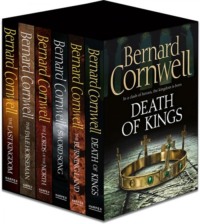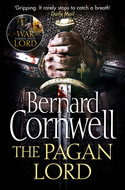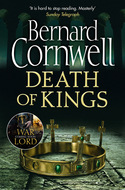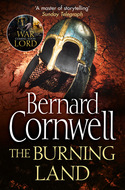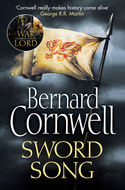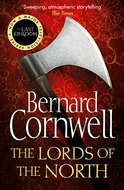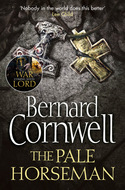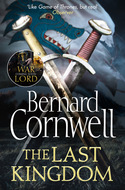Kitap dosya olarak indirilemez ancak uygulamamız üzerinden veya online olarak web sitemizden okunabilir.
Kitabı oku: «The Last Kingdom Series Books 1-6», sayfa 7
Three
Next day we made a pavilion in the valley between the town and the English encampment, stretching two ships’ sails between timber poles, the whole thing supported by seal-hide ropes lashed to pegs, and there the English placed three high-backed chairs for King Burghred, King Æthelred and for Prince Alfred, and draped the chairs with rich red cloths. Ivar and Ubba sat on milking stools.
Both sides brought thirty or forty men to witness the discussions, which began with an agreement that all weapons were to be piled twenty paces behind the two delegations. I helped carry swords, axes, shields and spears, then went back to listen.
Beocca was there and he spotted me. He smiled. I smiled back. He was standing just behind the young man I took to be Alfred, for though I had heard him in the night I had not seen him clearly. He alone among the three English leaders was not crowned with a circlet of gold, though he did have a large, jewelled cloak brooch which Ivar eyed rapaciously. I saw, as Alfred took his seat, that the prince was thin, long-legged, restless, pale and tall. His face was long, his nose long, his beard short, his cheeks hollow and his mouth pursed. His hair was a nondescript brown, his eyes worried, his brow creased, his hands fidgety and his face frowning. He was only nineteen, I later learned, but he looked ten years older. His brother, King Æthelred, was much older, over thirty, and he was also long-faced, but burlier and even more anxious-looking, while Burghred, King of Mercia, was a stubby man, heavy-bearded, with a bulging belly and a balding pate.
Alfred said something to Beocca who produced a sheet of parchment and a quill which he gave to the prince. Beocca then held a small vial of ink so that Alfred could dip the quill and write.
‘What is he doing?’ Ivar asked.
‘He is making notes of our talks,’ the English interpreter answered.
‘Notes?’
‘So there is a record, of course.’
‘He has lost his memory?’ Ivar asked, while Ubba produced a very small knife and began to clean his fingernails. Ragnar pretended to write on his hand, which amused the Danes.
‘You are Ivar and Ubba?’ Alfred asked through his interpreter.
‘They are,’ our translator answered. Alfred’s pen scratched, while his brother and brother-in-law, both kings, seemed content to allow the young prince to question the Danes.
‘You are sons of Lothbrok?’ Alfred continued.
‘Indeed,’ the interpreter answered.
‘And you have a brother? Halfdan?’
‘Tell the bastard to shove his writing up his arse,’ Ivar snarled, ‘and to shove the quill up after it, and then the ink until he shits black feathers.’
‘My lord says we are not here to discuss family,’ the interpreter said suavely, ‘but to decide your fate.’
‘And to decide yours,’ Burghred spoke for the first time.
‘Our fate?’ Ivar retorted, making the Mercian king quail from the force of his skull-gaze, ‘our fate is to water the fields of Mercia with your blood, dung the soil with your flesh, pave it with your bones, and rid it of your filthy stink.’
The discussion carried on like that for a long time, both sides threatening, neither yielding, but it had been the English who called for the meeting and the English who wanted to make peace and so the terms were slowly hammered out. It took two days, and most of us who were listening became bored and lay on the grass in the sunlight. Both sides ate in the field, and it was during one such meal that Beocca cautiously came across to the Danish side and greeted me warily. ‘You’re getting tall, Uhtred,’ he said.
‘It is good to see you, father,’ I answered dutifully. Ragnar was watching, but without any sign of worry on his face.
‘You’re still a prisoner, then?’ Beocca asked.
‘I am,’ I lied.
He looked at my two silver arm rings which, being too big for me, rattled at my wrist. ‘A privileged prisoner,’ he said wryly.
‘They know I am an Ealdorman,’ I said.
‘Which you are, God knows, though your uncle denies it.’
‘I have heard nothing of him,’ I said truthfully.
Beocca shrugged. ‘He holds Bebbanburg. He married your father’s wife and now she is pregnant.’
‘Gytha!’ I was surprised. ‘Pregnant?’
‘They want a son,’ Beocca said, ‘and if they have one …’ he did not finish the thought, but nor did he need to. I was the Ealdorman, and Ælfric had usurped my place, yet I was still his heir and would be until he had a son. ‘The child must be born any day now,’ Beocca said, ‘but you need not worry.’ He smiled and leaned towards me so he could speak in a conspiratorial whisper. ‘I brought the parchments.’
I looked at him with utter incomprehension. ‘You brought the parchments?’
‘Your father’s will! The land-charters!’ He was shocked that I did not immediately understand what he had done. ‘I have the proof that you are the Ealdorman!’
‘I am the Ealdorman,’ I said, as if proof did not matter. ‘And always will be.’
‘Not if Ælfric has his way,’ Beocca said, ‘and if he has a son then he will want the boy to inherit.’
‘Gytha’s children always die,’ I said.
‘You must pray that every child lives,’ Beocca said crossly, ‘but you are still the Ealdorman. I owe that to your father, God rest his soul.’
‘So you abandoned my uncle?’ I asked.
‘Yes, I did!’ he said eagerly, plainly proud that he had fled Bebbanburg. ‘I am English,’ he went on, his crossed eyes blinking in the sun, ‘so I came south, Uhtred, to find Englishmen willing to fight the pagans, Englishmen able to do God’s will and I found them in Wessex. They are good men, godly men, stalwart men!’
‘Ælfric doesn’t fight the Danes?’ I asked. I knew he did not, but I wanted to hear it confirmed.
‘Your uncle wants no trouble,’ Beocca said, ‘and so the pagans thrive in Northumbria and the light of our Lord Jesus Christ grows dimmer every day.’ He put his hands together as if in prayer, his palsied left hand quivering against his ink-stained right. ‘And it is not just Ælfric who succumbs. Ricsig of Dunholm gives them feasts, Egbert sits on their throne, and for that betrayal there must be weeping in heaven. It must be stopped, Uhtred, and I went to Wessex because the king is a godly man and knows it is only with God’s help that we can defeat the pagans. I shall see if Wessex is willing to ransom you.’ That last sentence took me by surprise so that instead of looking pleased I looked puzzled, and Beocca frowned. ‘You didn’t hear me?’ he asked.
‘You want to ransom me?’
‘Of course! You are noble, Uhtred, and you must be rescued! Alfred can be generous about such things.’
‘I would like that,’ I said, knowing it was what I was supposed to say.
‘You should meet Alfred,’ he said enthusiastically. ‘You’ll enjoy that!’
I had no wish to meet Alfred, certainly not after listening to him whimper about a servant girl he had humped, but Beocca was insistent and so I went to Ragnar and asked his permission. Ragnar was amused. ‘Why does the squinty bastard want you to meet Alfred?’ he asked, looking at Beocca.
‘He wants me to be ransomed. He thinks Alfred might pay.’
‘Pay good money for you!’ Ragnar laughed. ‘Go on,’ he said carelessly, ‘it never hurts to see the enemy close up.’
Alfred was with his brother, some distance away, and Beocca talked to me as he led me towards the royal group. ‘Alfred is his brother’s chief helper,’ he explained. ‘King Æthelred is a good man, but nervous. He has sons, of course, but both are very young …’ his voice tailed away.
‘So if he dies,’ I said, ‘the eldest son becomes king?’
‘No, no!’ Beocca sounded shocked, ‘Æthelwold’s much too young. He’s no older than you!’
‘But he’s the king’s son,’ I insisted.
‘When Alfred was a small boy,’ Beocca leaned down and lowered his voice, though not its intensity, ‘his father took him to Rome. To see the Pope! And the Pope, Uhtred, invested him as the future king!’ He stared at me as if he had proved his point.
‘But he’s not the heir,’ I said, puzzled.
‘The Pope made him heir!’ Beocca hissed at me. Later, much later, I met a priest who had been in the old king’s entourage and he said Alfred had never been invested as the future king, but instead had been given some meaningless Roman honour, but Alfred, to his dying day, insisted the Pope had conferred the succession on him, and so justified his usurpation of the throne that by rights should have gone to Æthelred’s eldest son.
‘But if Æthelwold grows up,’ I began.
‘Then of course he might become king,’ Beocca interrupted me impatiently, ‘but if his father dies before Æthelwold grows up then Alfred will be king.’
‘Then Alfred will have to kill him,’ I said, ‘him and his brother.’
Beocca gazed at me in shocked amazement. ‘Why do you say that?’ he asked.
‘He has to kill them,’ I said, ‘just like my uncle wanted to kill me.’
‘He did want to kill you. He probably still does!’ Beocca made the sign of the cross, ‘but Alfred is not Ælfric! No, no. Alfred will treat his nephews with Christian mercy, of course he will, which is another reason he should become king. He is a good Christian, Uhtred, as I pray you are, and it is God’s will that Alfred should become king. The Pope proved that! And we have to obey God’s will. It is only by obedience to God that we can hope to defeat the Danes.’
‘Only by obedience?’ I asked. I thought swords might help.
‘Only by obedience,’ Beocca said firmly, ‘and by faith. God will give us victory if we worship him with all our hearts, and if we mend our ways and give him the glory. And Alfred will do that! With him at our head the very hosts of heaven will come to our aid. Æthelwold can’t do that. He’s a lazy, arrogant, tiresome child.’ Beocca seized my hand and pulled me through the entourage of West Saxon and Mercian lords. ‘Now remember to kneel to him, boy, he is a prince.’ He led me to where Alfred was sitting and I duly knelt as Beocca introduced me. ‘This is the boy I spoke of, lord,’ he said, ‘he is the Ealdorman Uhtred of Northumbria, a prisoner of the Danes since Eoferwic fell, but a good boy.’
Alfred gave me an intense look which, to be honest, made me uncomfortable. I was to discover in time that he was a clever man, very clever, and thought twice as fast as most others, and he was also a serious man, so serious that he understood everything except jokes. Alfred took everything heavily, even a small boy, and his inspection of me was long and searching as if he tried to plumb the depths of my unfledged soul. ‘Are you a good boy?’ he finally asked me.
‘I try to be, lord,’ I said.
‘Look at me,’ he ordered, for I had lowered my eyes. He smiled when I met his gaze. There was no sign of the sickness he had complained of when I eavesdropped on him and I wondered if, after all, he had been drunk that night. It would have explained his pathetic words, but now he was all earnestness. ‘How do you try to be good?’ he asked.
‘I try to resist temptation, lord,’ I said, remembering Beocca’s words to him behind the tent.
‘That’s good,’ he said, ‘very good, and do you resist it?’
‘Not always,’ I said, then hesitated, tempted to mischief, and then, as ever, yielded to temptation. ‘But I try, lord,’ I said earnestly, ‘and I tell myself I should thank God for tempting me and I praise him when he gives me the strength to resist the temptation.’
Both Beocca and Alfred stared at me as if I had sprouted angel’s wings. I was only repeating the nonsense I had heard Beocca advise Alfred in the dark, but they thought it revealed my great holiness, and I encouraged them by trying to look meek, innocent and pious. ‘You are a sign from God, Uhtred,’ Alfred said fervently. ‘Do you say your prayers?’
‘Every day, lord,’ I said, and did not add that those prayers were addressed to Odin.
‘And what is that about your neck? A crucifix?’ He had seen the leather thong and, when I did not answer, he leaned forward and plucked out Thor’s hammer that had been hidden behind my shirt. ‘Dear God,’ he said, and made the sign of the cross. ‘And you wear those too,’ he added, grimacing at my two arm rings which were cut with Danish rune-letters. I must have looked a proper little heathen.
‘They make me wear them, lord,’ I said, and felt his impulse to tear the pagan symbol off the thong, ‘and beat me if I don’t,’ I added hastily.
‘Do they beat you often?’ he asked.
‘All the time, lord,’ I lied.
He shook his head sadly, then let the hammer fall. ‘A graven image,’ he said, ‘must be a heavy burden for a small boy.’
‘I was hoping, lord,’ Beocca intervened, ‘that we could ransom him.’
‘Us?’ Alfred asked, ‘ransom him?’
‘He is the true Ealdorman of Bebbanburg,’ Beocca explained, ‘though his uncle has taken the title, but the uncle will not fight the Danes.’
Alfred gazed at me, thinking, then frowned. ‘Can you read, Uhtred?’ he asked.
‘He has begun his lessons,’ Beocca answered for me. ‘I taught him, lord, though in all honesty he was ever a reluctant pupil. Not good with his letters, I fear. His thorns were prickly and his ashes spindly.’
I said that Alfred did not understand jokes, but he loved that one, even though it was feeble as watered milk and stale as old cheese. But it was beloved of all who taught reading, and both Beocca and Alfred laughed as though the jest were fresh as dew at sunrise. The thorn, ð and the ash, æ were two letters of our alphabet. ‘His thorns are prickly,’ Alfred echoed, almost incoherent with laughter, ‘and his ashes spindly. His b’s don’t buzz and his i’s,’ he stopped, suddenly embarrassed. He had been about to say my i’s were crossed, then he remembered Beocca and he looked contrite. ‘My dear Beocca.’
‘No offence, my lord, no offence.’ Beocca was still happy, as happy as when he was immersed in some tedious text about how Saint Cuthbert baptised puffins or preached the gospel to the seals. He had tried to make me read that stuff, but I had never got beyond the shortest words.
‘You are fortunate to have started your studies early,’ Alfred said to me, recovering his seriousness. ‘I was not given a chance to read until I was twelve years old!’ His tone suggested I should be shocked and surprised by this news so I dutifully looked appalled. ‘That was grievously wrong of my father and stepmother,’ Alfred went on sternly, ‘they should have started me much earlier.’
‘Yet now you read as well as any scholar, my lord,’ Beocca said.
‘I do try,’ Alfred said modestly, but he was plainly delighted with the compliment.
‘And in Latin too!’ Beocca said, ‘and his Latin is much better than mine!’
‘I think that’s true,’ Alfred said, giving the priest a smile.
‘And he writes a clear hand,’ Beocca told me, ‘such a clear, fine hand!’
‘As must you,’ Alfred told me firmly, ‘to which end, young Uhtred, we shall indeed offer to ransom you, and if God helps us in that endeavour then you shall serve in my household and the first thing you will do is become a master of reading and writing. You’ll like that!’
‘I will, lord,’ I said, meaning it to sound as a question, though it came out as dull agreement.
‘You will learn to read well,’ Alfred promised me, ‘and learn to pray well, and learn to be a good honest Christian, and when you are of age you can decide what to be!’
‘I will want to serve you, lord,’ I lied, thinking that he was a pale, boring, priest-ridden weakling.
‘That is commendable,’ he said, ‘and how will you serve me, do you think?’
‘As a soldier, lord, to fight the Danes.’
‘If God wishes it,’ he said, evidently disappointed in my answer, ‘and God knows we shall need soldiers, though I pray daily that the Danes will come to a knowledge of Christ and so discover their sins and be led to end their wicked ways. Prayer is the answer,’ he said vehemently, ‘prayer and fasting and obedience, and if God answers our prayers, Uhtred, then we shall need no soldiers, but a kingdom always has need of good priests. I wanted that office for myself, but God disposed otherwise. There is no higher calling than the priestly service. I might be a prince, but in God’s eyes I am a worm while Beocca is a jewel beyond price!’
‘Yes, lord,’ I said, for want of anything else to say. Beocca tried to look modest.
Alfred leaned forward, hid Thor’s hammer behind my shirt, then laid a hand on my head. ‘God’s blessing on you, child,’ he said, ‘and may his face shine upon you and release you from your thraldom and bring you into the blessed light of freedom.’
‘Amen,’ I said.
They let me go then and I went back to Ragnar. ‘Hit me,’ I said.
‘What?’
‘Thump me around the head.’
He glanced up and saw that Alfred was still watching me, so he cuffed me harder than I expected. I fell down, grinning. ‘So why did I just do that?’ Ragnar asked.
‘Because I said you were cruel to me,’ I said, ‘and beat me constantly.’ I knew that would amuse Ragnar and it did. He hit me again, just for luck. ‘So what did the bastards want?’ he asked.
‘They want to ransom me,’ I said, ‘so they can teach me to read and write, and then make me into a priest.’
‘A priest? Like the squinty little bastard with the red hair?’
‘Just like him.’
Ragnar laughed. ‘Maybe I should ransom you. It would be a punishment for telling lies about me.’
‘Please don’t,’ I said fervently, and at that moment I wondered why I had ever wanted to go back to the English side. To exchange Ragnar’s freedom for Alfred’s earnest piety seemed a miserable fate to me. Besides, I was learning to despise the English. They would not fight, they prayed instead of sharpening their swords, and it was no wonder the Danes were taking their land.
Alfred did offer to ransom me, but balked at Ragnar’s price that was ludicrously high, though not nearly so steep as the price Ivar and Ubba extracted from Burghred.
Mercia was to be swallowed. Burghred had no fire in his big belly, no desire to go on fighting the Danes who got stronger as he grew weaker. Perhaps he was fooled by all those shields on Snotengaham’s walls, but he must have decided he could not beat the Danes and instead he surrendered. It was not just our forces in Snotengaham that persuaded him to do this. Other Danes were raiding across the Northumbrian border, ravaging Mercian lands, burning churches, slaughtering monks and nuns, and those horsemen were now close to Burghred’s army and were forever harassing his forage parties, and so Burghred, weary of unending defeat, weakly agreed to every outrageous demand, and in return he was allowed to stay as King of Mercia, but that was all. The Danes were to take his fortresses and garrison them, and they were free to take Mercian estates as they wished, and Burghred’s fyrd was to fight for the Danes if they demanded it, and Burghred, moreover, was to pay a vast price in silver for this privilege of losing his kingdom while keeping his throne. Æthelred and Alfred, having no part to play in the discussions, and seeing that their ally had collapsed like a pricked bladder, left on the second day, riding south with what remained of their army, and thus Mercia fell.
First Northumbria, then Mercia. In just two years half of England was gone and the Danes were only just beginning.
We ravaged the land again. Bands of Danes rode into every part of Mercia and slaughtered whoever resisted, took whatever they wished, then garrisoned the principal fortresses before sending messages to Denmark for more ships to come. More ships, more men, more families and more Danes to fill the great land that had fallen into their laps.
I had begun to think I would never fight for England because by the time I was old enough to fight there would be no England. So I decided I would be a Dane. Of course I was confused, but I did not spend much time worrying about my confusion. Instead, as I approached twelve years old, I began my proper education. I was made to stand for hours holding a sword and shield stretched out in front of me until my arms ached, I was taught the strokes of the blade, made to practise with throwing spears, and given a pig to slaughter with a war spear. I learned to fend with a shield, how to drop it to stop the lunge beneath the rim, and how to shove the heavy shield boss into an enemy’s face to smash his nose and blind him with tears. I learned to pull an oar. I grew, put on muscle, began to speak in a man’s voice and was slapped by my first girl. I looked like a Dane. Strangers still mistook me for Ragnar’s son for I had the same fair hair that I wore long and tied with a strip of leather at the nape of my neck, and Ragnar was pleased when that happened though he made it plain that I would not replace Ragnar the Younger or Rorik. ‘If Rorik lives,’ he said sadly, for Rorik was still sickly. ‘You will have to fight for your inheritance,’ Ragnar told me, and so I learned to fight and, that winter, to kill.
We returned to Northumbria. Ragnar liked it there and, though he could have taken better land in Mercia, he liked the northern hills and the deep vales and the dark hanging woods where, as the first frosts crisped the morning, he took me hunting. A score of men and twice as many dogs beat through the woods, trying to trap boar. I stayed with Ragnar, both of us armed with heavy boar spears. ‘A boar can kill you, Uhtred,’ he warned me, ‘he can rip you from the crotch to the neck unless you place the spear just right.’
The spear, I knew, must be placed in the beast’s chest or, if you were lucky, down its throat. I knew I could not kill a boar, but if one came, I would have to try. A full-grown boar can be twice the weight of a man and I did not have the strength to drive one back, but Ragnar was determined to give me first strike and he would be close behind to help. And so it happened. I have killed hundreds of boar since, but I will always remember that first beast; the small eyes, the sheer anger, the determination, the stench, the bristling hairs flecked with mud, and the sweet thud of the spear going deep into the chest, and I was hurled back as if I had been kicked by Odin’s eight-legged horse, and Ragnar drove his own spear through the thick hide and the beast squealed and roared, legs scrabbling, and the pursuing dogs howled, and I found my feet, gritted my teeth, and put my weight on the spear and felt the boar’s life pulsing up the ash shaft. Ragnar gave me a tusk from that carcass and I hung it next to Thor’s hammer and in the days that followed I wanted to do nothing except hunt, though I was not allowed to pursue boar unless Ragnar was with me, but when Rorik was well enough he and I would take our bows into the woods to look for deer.
It was on one of those expeditions, high up at the edge of the woods, just beneath the moors that were dappled by melting snow, that the arrow almost took my life. Rorik and I were creeping through undergrowth and the arrow missed me by inches, sizzling past my head to thump into an ash tree. I turned, putting an arrow on my own string, but saw no one, then we heard feet racing away downhill through the trees and we followed, but whoever had shot the arrow ran too fast for us.
‘An accident,’ Ragnar said. ‘He saw movement, thought you were a deer, and loosed. It happens.’ He looked at the arrow which we had retrieved, but it had no marks of ownership. It was just a goose-fledged shaft of hornbeam tipped with an iron head. ‘An accident,’ he decreed.
Later that winter we moved back to Eoferwic and spent days repairing the boats. I learned to split oak trunks with wedge and mallet, cleaving out the long pale planks that patched the rotted hulls. Spring brought more ships, more men, and with them was Halfdan, youngest brother of Ivar and Ubba. He came ashore roaring with energy, a tall man with a big beard and scowling eyes. He embraced Ragnar, thumped me on the shoulder, punched Rorik in the head, swore he would kill every Christian in England, then went to see his brothers. The three of them planned the new war which, they promised, would strip East Anglia of its treasures and, as the days warmed, we readied for it.
Half the army would march by land, while the other half, which included Ragnar’s men, would go by sea and so I anticipated my first proper voyage, but before we left Kjartan came to see Ragnar, and trailing him was his son Sven, his missing eye a red hole in his angry face. Kjartan knelt to Ragnar and bowed his head. ‘I would come with you, lord,’ he said.
Kjartan had made a mistake by letting Sven follow him, for Ragnar, usually so generous, gave the boy a sour look. I call him a boy, but in truth Sven was almost a man now and promised to be a big one, broad in the chest, tall and strong. ‘You would come with me,’ Ragnar echoed flatly.
‘I beg you, lord,’ Kjartan said, and it must have taken a great effort to say those words, for Kjartan was a proud man, but in Eoferwic he had found no plunder, earned no arm rings, and made no reputation for himself.
‘My ships are full,’ Ragnar said coldly, and turned away. I saw the look of hatred on Kjartan’s face.
‘Why doesn’t he sail with someone else?’ I asked Ravn.
‘Because everyone knows he offended Ragnar, so to give him a place at the oars is to risk my son’s dislike.’ Ravn shrugged. ‘Kjartan should go back to Denmark. If a man loses his lord’s trust then he has lost everything.’
But Kjartan and his one-eyed son stayed in Eoferwic instead of going back to Denmark, and we sailed, first flowing with the current back down the Ouse and so into the Humber where we spent the night. Next morning we took the shields off the ships’ sides, then waited till the tide lifted their hulls and we could row eastwards into the first great seas.
I had been offshore at Bebbanburg, going with fishermen to cast nets about the Farne Islands, but this was a different sensation. The Wind-Viper rode those waves like a bird instead of thrashing through like a swimmer. We rowed out of the river, then took advantage of a north-west wind to hoist the great sail and the oars were fiddled out of their holes, the holes were covered with wooden plugs and the great sweeps stored inboard as the sail cracked, bellied, trapped the wind and drove us southwards. There were eighty-nine ships altogether, a fleet of dragon-headed killers, and they raced each other, calling insults whenever they travelled faster than some other boat. Ragnar leaned on the steering oar, his hair flying in the wind and a smile as broad as the ocean on his face. Seal-hide ropes creaked, the boat seemed to leap up the seas, seethe through their tops and slide in flying spray down their faces. I was frightened at first, for the Wind-Viper bent to that wind, almost dropping her leeward side beneath the great green sea, but then I saw no fear on the other men’s faces and I learned to enjoy the wild ride, whooping with delight when the bow smashed into a heavy sea and the green water flew like an arrow shower down the deck.
‘I love this!’ Ragnar called to me. ‘In Valhalla I hope to find a ship, a sea and a wind!’
The shore was ever in sight, a low green line to our right, sometimes broken by dunes, but never by trees or hills, and as the sun sank we turned towards that land and Ragnar ordered the sail furled and the oars out.
We rowed into a water land, a place of marsh and reed, of bird cries and long-legged herons, of eel traps and ditches, of shallow channels and long meres, and I remembered my father saying the East Anglians were frogs. We were on the edge of their country now, at the place where Mercia ended and East Anglia began in a tangle of water, mud and salt flats. ‘They call it the Gewæsc,’ Ragnar said.
‘You’ve been here?’
‘Two years ago,’ he said. ‘Good country to raid, Uhtred, but treacherous water. Too shallow.’
The Gewæsc was very shallow and Weland was in the Wind-Viper’s bow, weighing the depth with a lump of iron tied to a rope. The oars only dipped if Weland said there was sufficient water and so we crept westwards into the dying light followed by the rest of the fleet. The shadows were long now, the red sun slicing into the open jaws of the dragon, serpent and eagle heads on the ships’ prows. The oars worked slowly, their blades dripping water as they swept forward for the next stroke, and our wake spread in long slow ripples touched red by dying sun-fire.
We anchored that night and slept aboard the ships and in the dawn Ragnar made Rorik and me climb his mast. Ubba’s ship was nearby and he too had men clambering up towards the painted wind-vane at the masthead.
‘What can you see?’ Ragnar called up to us.
‘Three men on horseback,’ Rorik answered, pointing south, ‘watching us.’
‘And a village,’ I added, also pointing south.
To the men on shore we were something from their darkest fears. All they could see was a thicket of masts and the savage carved beasts at the high prows and sterns of our ships. We were an army, brought here by our dragon boats, and they knew what would follow and, as I watched, the three horsemen turned and galloped south.
We went on. Ubba’s ship led the way now, following a twisting shallow channel and I could see Ubba’s sorcerer, Storri, standing in the bows and I guessed he had cast the runes and predicted success. ‘Today,’ Ragnar told me wolfishly, ‘you will learn the Viking way.’
To be a Viking was to be a raider, and Ragnar had not conducted a shipborne raid in many years. He had become an invader instead, a settler, but Ubba’s fleet had come to ravage the coastline and draw the East Anglian army towards the sea while his brother, Ivar, led the land army south from Mercia, and so that early summer I learned the Viking ways. We took the ships to the mainland where Ubba found a stretch of land with a thin neck that could easily be defended and, once our ships were safely drawn onto the beach, we dug an earthwork across the neck as a rampart. Then large parties of men disappeared into the countryside, returning next morning with captured horses and the horses were used to mount another war-band that rode inland as Ragnar led his men on foot along the tangled shoreline.
